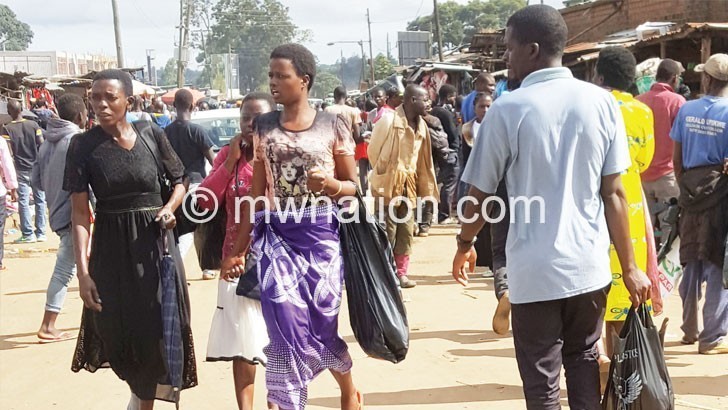Market day in face of Covid-19
It is a Friday at Limbe Market in Blantyre, the time is 4.30pm when most people are knocking off from their various workplaces.
However, the situation at Limbe Market is as if the market is just opening for the day. There are hundreds of people of all ages and sexes.
Some are here selling second-hand clothes and shoes, fish, potatoes and meat. Others are here to buy these commodities. One wonders what time they will leave for their homes from the buzzing market.
These people are coming from various places. Some are from townships and villages within Blantyre while others are from surrounding districts of Mulanje, Thyolo, Chikwawa, Chiradzulu and Zomba. Yet others have come from as far as Mangochi, Mwanza and Phalombe.

However, while the market is filled like this and everyone seems in a rush, one thing that cannot be missed is how most of the people are donning face masks of all shapes and colours. They are home-made and tailor-made cloth face masks and surgical masks, among others.
These people are wearing the masks to protect themselves from coronavirus (Covid-19) infection which originated from Wuhan City in China last December and has spread across the globe to Europe, United States and Africa.
The virus is transmitted through droplets when an infected person coughs, sneezes or speaks. It also spreads when one touches contaminated surfaces and the mouth, nose or eyes without washing hands with soap.
The high risk of spreading through crowded places has forced President Peter Mutharika to ban gatherings of at least 100 people, suspend learning in schools and advise employers to decongest workplaces.
While Malawians in the past three months have been hearing of thousands of people that have been affected or have died globally, the country confirmed its first three cases last Thursday.
As of Tuesday this week, Malawi had eight Covid-19 confirmed cases and one death.
Almost 4 500 people are on self-quarantine nationwide and the Ministry of Health last week admitted facing challenges to track them.
The ministry’s director of quality and digital health Dr Andrew Likaka said this situation could put more people at risk.
He said: “We have noted that some people are giving us fake contact numbers and addresses, among others.
“It is, therefore, becoming difficult for health workers to make follow ups, mainly on those that are in self-isolation. Tracking them is actually a nightmare. It is something we cannot afford to be doing now.”
No choice available
Leonard Namate from Manje Township in Blantyre realises what a risk it is for him to be at Limbe Market the whole day selling second-hand shoes when social distancing is advanced and when it is highly likely that some Covid-19 infected people could be out there walking freely.
The father of three says he has no choice but to be at the market otherwise his family will starve and get evicted from the rented house because he has failed to provide for them.
“My business is so small such that I don’t keep money in the bank. I use the money that I make from my daily sells to buy basic items such as relish, maize flour and soap.
“I only keep a little from that money to pay for rent which is K22 000 a month. As such, I cannot afford to stay at home. I just can’t,” says Namate.
Beef offal seller Tamandani Lackson came to the market around 3pm from Machinjiri Township in Blantyre.
The 52-year-old knows about the Covid-19 situation in Malawi and the measures that have been put in place to protect people.
However, Lackson admitted that not coming to the jam-packed market for business just to observe social distancing is going to be hard for her.
She explains: “That will mean having no food for my two children and three grandchildren.
“I know I am taking a risk by coming to the market every day because I interact with different people, but there is little that I can do. My survival and that of my family depends on it.”
The situation at Limbe Market is no different to what is happening in other markets such as Mpanipani (Lilongwe main market) and Bwalo la Njobvu in Lilongwe as well as Taifa and main markets in Mzuzu where hundreds of people buy or sell various commodities.
Solution?
Noting the danger that lies in markets, Minister of Health Jappie Mhango, who chairs the Special Cabinet Task Committee on Covid-19, on Tuesday announced an immediate ban of market days in villages.
“The normal market days will continue to take place, but because these market days bring together a lot of people, that is why they should no longer continue,” said the minister.
What will happen to markets in cities such as Blantyre, Lilongwe and Mzuzu which are usually filled with hundreds of people every day was not said. How people who survive from earnings from such market days should move forward was also not said. Until then, small-scale businesspersons who survive on hand-to-mouth such as Namate and Lackson will continue going to Limbe every day to earn a livelihood





